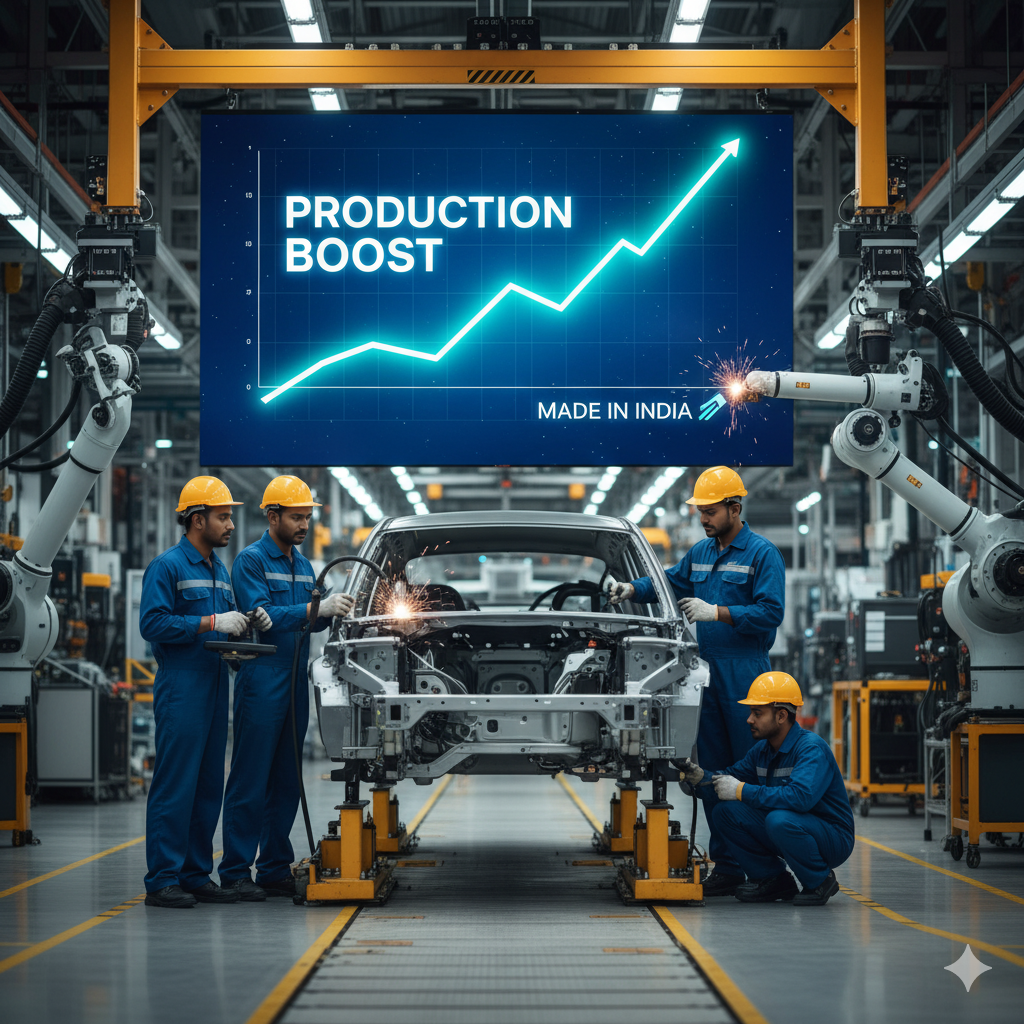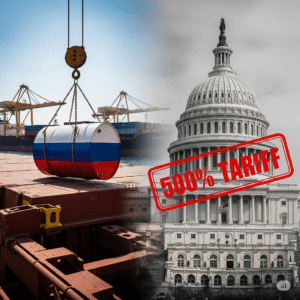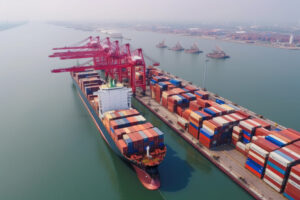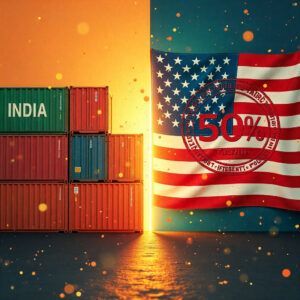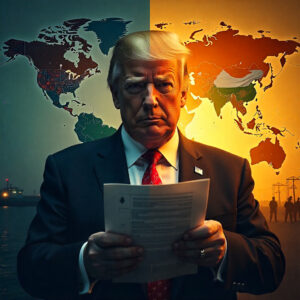By Akash Gupta, Kolkata | Sunshine Cargo Services Pvt. Ltd. | Published – September 11, 2025
India’s Auto Market Opens: Global Firms Welcome to Test, Invest
India is making a big push to attract foreign investment in its automobile sector. The government is creating a more open and competitive environment.
This is happening through lowered customs duties and new Free Trade Agreements (FTAs). This strategy aims to boost domestic manufacturing and give Indian consumers more choices.
India’s automotive landscape is at a turning point. A new government strategy seeks to blend domestic protection with global competition. This shift is designed to attract international players.
It provides a chance for them to test their products here before committing to major investments. For businesses like yours, this creates exciting new opportunities in trade and logistics. We will explore how these changes can impact the industry and your supply chain.
Looking for a reliable partner to take away all your import hassle? Contact us today!
Key Takeaways
- The Indian government is actively encouraging global auto firms to test and invest in the country.
- Piyush Goyal stated this policy balances support for domestic industry with the benefits of fair competition.
- Global companies like Mercedes-Benz are already calling India a “priority market” and are increasing their investments.
Table of Contents
- What is the New Automotive Policy?
- Why This Shift Matters Now
- How the New Policy Works
- Three Pillars to Succeed in the New Market
- Customs & Compliance Checklist
- Essential Tools & Resources
- Case Study: Mercedes-Benz’s India Strategy
- Common Mistakes to Avoid
- FAQs
- Conclusion
What is the New Automotive Policy?
In short: The new policy is a government initiative to invite global car manufacturers to India. It uses reduced customs duties and new FTAs to encourage them to test their products and eventually invest in local manufacturing.
Union Minister of Commerce & Industry Piyush Goyal announced this new approach at the 7th Auto Conclave hosted by the Federation of Automobile Dealers Associations (FADA).
He stated that India will welcome global automakers to test their products in the country. This is a way to get them interested in setting up manufacturing here.
The government has already lowered customs duties on imported Completely Built Units (CBUs). This makes it easier for foreign companies to bring their vehicles in.
The goal is to create a “proper balance between protection and possibilities of expanding business.” This new policy recognizes that competition improves efficiency and gives customers better options.
Why This Shift Matters Now
In short: This policy is critical because it aims to make India a global manufacturing hub. It also makes the domestic market more competitive, which benefits Indian businesses and consumers.
The move comes at a time of significant change. Bilateral trade between the EU and India reached USD 135 billion in 2023–24 [1]. The new policy is designed to capture a larger share of this global market.
Minister Goyal noted that if the domestic industry is to grow, it needs to be challenged by global players. This pushes local manufacturers to improve. For example, auto component makers have asked the government to open up global markets for them.
They are confident they can compete with anyone. This confidence is a major reason for the policy shift. India is also in the final rounds of negotiating an EU-India Free Trade Agreement (FTA).
This agreement will further reduce tariffs and open up the market. For logistics companies, this means more trade volume and new customs requirements. If you want to know more about how FTAs work, you can check our guide on the India-UK FTA here.
How the New Policy Works
The policy works on two main fronts: market access and investment attraction. Each part is designed to work together.
The Role of Reduced Customs Duties
In short: The government has lowered duties on imported Completely Built Units (CBUs). This allows foreign firms to bring in their finished cars for a lower cost.
The reduction in customs duties on CBUs is a key part of the plan. This makes it more attractive for companies to enter the Indian market. They can test consumer response without the high initial cost of setting up a local factory.
The new EV scheme, for example, allows for a reduced customs duty of 15% on CBUs valued over USD 35,000 [2]. This is capped at 8,000 units per year for five years. The policy requires a minimum investment of ₹4,150 crore in domestic manufacturing within three years to qualify. This ensures that the import benefit is tied to a long-term commitment.
The Importance of Free Trade Agreements (FTAs)
In short: India is actively pursuing new FTAs with developed nations. This will reduce tariffs and streamline trade.
FTAs are a crucial tool in this new strategy. India is in talks with the European Union (EU) for a comprehensive FTA. This is expected to lower tariffs on a wide range of goods, including cars. Negotiations are progressing, with many chapters already concluded [1].
These agreements create a more predictable and stable trading environment. This reassures foreign companies that their investments are safe. For importers and exporters, FTAs simplify trade logistics and reduce costs.
Balancing Act: Protection vs. Competition
In short: The government is seeking a balance between supporting local industry and allowing global competition. The goal is to push for innovation.
Minister Goyal said that a “fair competition” is needed. This will help the domestic industry improve its product quality and efficiency. The policy will continue to support domestic manufacturers. However, it will not protect them from competition entirely.
The idea is that global entry will push local firms to innovate and become more resilient. This is a fundamental change from past policies that focused more on protectionism. This new approach aligns with the vision of making India a global manufacturing powerhouse.
For a broader look at India’s reforms, you can read our article on the CII reform roadmap.
Three Pillars to Succeed in the New Market
Navigating this new environment requires a strategic approach. Here are three key pillars for success.
1. Master Customs and Compliance
The changing tariff structure and new FTAs mean that customs compliance is more complex than ever. Businesses must stay updated on all regulations. This includes understanding the specific duty cuts for CBUs and the rules of origin under new FTAs.
Without expert guidance, you risk costly delays and penalties. For example, a global automaker importing high-value components needs to ensure their Bill of Entry is filed correctly. Any error could lead to a BE query on ICEGATE, causing delays in production. Professional customs agents are vital for this.
2. Optimize Your Supply Chain
With new players entering the market, supply chains will become more dynamic. You need to focus on efficiency and resilience. This involves finding new logistics partners and streamlining your processes.
A smart supply chain can give you a major competitive advantage. For instance, a component supplier for an OEM might need to re-evaluate their transport methods to ensure timely delivery. They might switch from sea freight to air freight for high-value items to reduce transit time and lower costs.
Our guide on demurrage and detention charges can also help you avoid unnecessary costs.
3. Leverage Technology for Visibility
Digital tools are essential for managing a modern supply chain. Using platforms like ICEGATE for filing documents and tracking shipments is crucial. Technology provides real-time visibility.
This helps you anticipate and solve problems before they cause disruptions. For example, a company importing components can use a freight tracking system to know exactly when their shipment will arrive.
This helps them plan for customs clearance and avoid demurrage and detention charges. You can learn more about how to use ICEGATE here: How to file a Customs Transit Declaration (CTD).
Essential Tools & Resources
- ICEGATE Portal: The official platform for all customs clearance activities in India. Use it for filing Bills of Entry and other key documents.
- WCO Data Hub: The World Customs Organization’s database for global tariff and trade information.
- Government Websites: The websites of the Ministry of Commerce & Industry and CBIC are the best sources for official policy updates.
- Sunshine Cargo Services: Our team of experts specializes in customs clearance and freight forwarding in Kolkata. We provide full support to ensure a seamless process.
Case Study: Mercedes-Benz’s India Strategy
Even before the new policy was announced, some global giants saw the potential. Mercedes-Benz has called India a “priority market” [3]. The company confirmed that its investment plans in India have not been put on hold. This is despite the pending EU-India FTA.
Mathias Geisen, a member of the Board of Management of Mercedes-Benz Group AG, said the company has “considered multiple scenarios based on potential outcomes of the trade agreement.” But their strategy remains firm [3].
This proactive approach shows how forward-thinking companies are operating. They are not waiting for a deal to be finalized. Instead, they are positioning themselves to capitalize on the growth of the Indian market.
The company’s sales of 19,565 units last year were their best ever in India. This proves that there is strong demand for high-end vehicles. Mercedes-Benz is also planning to increase local production. They are looking to see where “localization makes sense” [3]. This long-term commitment is exactly what the new government policy hopes to encourage from all global players.
“We haven’t put any plans on hold compared to what we had originally,” Geisen said when asked if the carmaker was delaying investments in CKD (completely knocked down) facilities until more clarity emerges on the FTA. (Mathias Geisen – The Economic Times – September 9, 2025 – [Source 3])
This statement highlights that even with a major FTA on the horizon, the confidence in the Indian market is unwavering.
Common Mistakes to Avoid
- Ignoring New Regulations: Not staying updated on new customs duties and FTA rules can lead to significant fines.
- Poor Documentation: Errors in import-export documents can cause major delays. This can also result in demurrage charges. Learn how to file a Bill of Entry Amendment on ICEGATE to fix mistakes.
- Underestimating Competition: Relying on past protectionist policies is a mistake. The market is now open and highly competitive.
- Neglecting Local Partners: A strong local network is essential. This includes working with a reliable customs house agent.
FAQs
What is the new policy for global auto firms in India?
In short: The new policy, outlined by Minister Piyush Goyal, is an open invitation for global automakers to test and invest in India. The government is using reduced customs duties and upcoming Free Trade Agreements (FTAs) to encourage this.
This shift in policy moves away from a purely protectionist stance. It seeks to balance support for local manufacturers with the benefits of global competition.
The government believes this will lead to better products and more consumer choice. It also aims to boost India’s position as a global manufacturing hub.
How does this policy affect customs duties?
In short: The new policy includes a reduction in customs duties on Completely Built Units (CBUs). This allows foreign firms to import finished vehicles for testing and sale at a lower cost, which makes market entry more feasible.
For example, for a period of five years, companies that commit to local investment can import up to 8,000 electric vehicles annually at a reduced customs duty of 15% [2]. This is a strategic move to attract new players. This policy makes it easier for global brands to enter the market.
What is the EU-India FTA, and why is it important for the auto sector?
In short: The EU-India Free Trade Agreement is a trade deal under negotiation to reduce tariffs and barriers between India and the EU. It is important for the auto sector because it could significantly lower the cost of importing luxury cars and auto components.
The agreement covers many chapters, and negotiations are moving quickly. A successful deal would make European cars more affordable in India. This would increase competition and benefit consumers. It would also help Indian auto parts makers export more to the EU.
How are major companies like Mercedes-Benz responding to this?
In short: Major companies like Mercedes-Benz are already responding positively. They are reaffirming their commitment to India and continuing to invest in local production. They view India as a “priority market” for long-term growth.
Mercedes-Benz has stated that it has not put any of its investment plans on hold because of the impending FTA. This shows that the market potential and long-term growth are more important than short-term regulatory changes. The company is actively looking for new opportunities for localization.
What is the role of a customs agent in this new environment?
In short: A customs agent’s role is more critical than ever. They are essential for navigating complex customs regulations, managing new duties under FTAs, and ensuring seamless clearance of goods.
A reliable customs agent can help you with proper documentation. They can also provide real-time updates on regulations. This expertise is vital for avoiding delays and costly fines.
For instance, an expert agent can help you respond to customs queries on ICEGATE. This helps you keep your supply chain running smoothly. For more essential tips on customs, check out our list of 50 essential topics on customs and compliance.
Conclusion
India’s new automotive policy is a clear signal to the world. The country is opening up for business. This move is a strategic blend of protecting local industry while encouraging global competition.
By reducing customs duties and pursuing FTAs, the government is creating a more attractive market for international players. This will lead to a more dynamic, competitive, and innovative auto sector.
To succeed in this new environment, you need a strong partner. Sunshine Cargo Services Pvt. Ltd. is here to help you navigate these changes. From customs clearance to freight forwarding, we ensure your business stays ahead.
Contact Sunshine Cargo Services Today for Expert Customs & Logistics Solutions.
Sources & Backlinks
- India-EU FTA: Negotiations progressing well on different parts; over 60% chapters finalised says Goyal — The Times of India — September 9, 2025 — https://timesofindia.india
times.com/business/india-business/india-eu-fta-negotiations-progressing-well-on-different-parts-over-60-chapters-finalised-says-goyal/articleshow/
123789176.cms - Govt issues guidelines for eletric car manufacturing scheme, offers major import tax cuts for local production — Upstox — June 2, 2025 — https://upstox.com/news/
business-news/latest-updates/govt-issues-guidelines-for-eletric-car-manufacturing-cbu-duty-relief-4-150-cr-investment-key-features/article-171234/ - Mercedes-Benz calls India a ‘priority market’, vows to keep investing despite impending EU-India FTA — The Economic Times — September 9, 2025 — https://m.economictimes
.com/industry/auto/cars-uvs/mercedes-benz-calls-india-a-priority-market-vows-to-keep-investing-despite-impending-eu-india-fta/articleshow/
123786659.cms - Auto retail sector key interface between consumers and industry: Piyush Goyal — PIB — September 10, 2025 — https://www.pib.gov.in/
PressReleseDetailm.aspx?PRID=2165466
